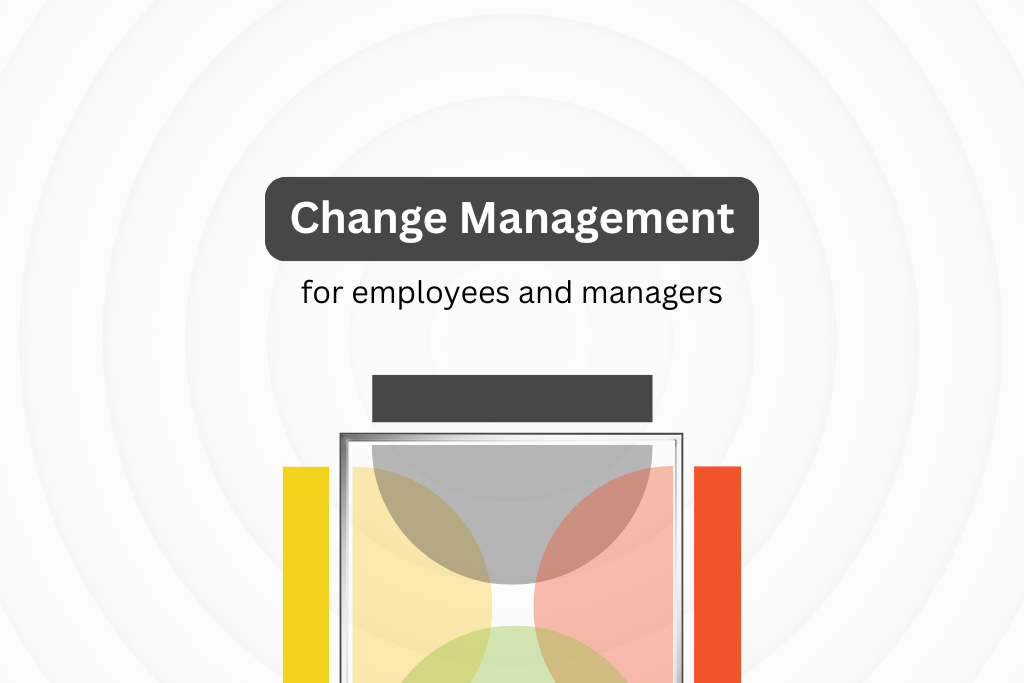Change Management
Imagine your employees and managers going through change – not with resistance, but with conviction.
Because they recognize the meaning. Because they are allowed to help shape things. Because they feel trust.
Change is no longer experienced as a threat – but as a shared opportunity.
Change should not feel difficult.
But meaningful. Moving. And exciting.
➡️ We accompany your change with clarity, structure and heart – so that change succeeds and really works.
We take our time – for your real situation.
The world is changing – and so is your company.
Change is no longer the exception, but the new constant.
Whether through technological innovations, new markets or internal reorganization – if you want to remain competitive, you have to constantly develop yourself and your company.
But change can only succeed if people are involved. Change management means actively shaping the emotional, mental and communicative aspects of change – with clarity, structure and attitude.

Change can only succeed if people are involved.
To ensure that change is not only planned but also successfully implemented, we offer you two targeted approaches.
Two ways of support – depending on the initial situation
Change management workshops & seminars
Empowering employees and managers – for everyday change and major upheavals
Our interactive group formats prepare your teams specifically for change – on both a small and a large scale.
Because if you understand change, you can support it – and even shape it.
For employees
We sensitize people to the emotional side of change, promote personal responsibility and strengthen the mindset of seeing change as a personal opportunity.
For managers
We enable you to actively lead change: Communicate clearly, build trust, recognize resistance and deal professionally with uncertainties in the team.
The perfect mix
Ideally, managers and employees take part in separate workshops – because their roles, challenges and development steps are different. This creates a common understanding, but with targeted, suitable tools for both sides.
Process support from change experts
Strategic support – when change is more than just a workshop
Some change processes are complex, emotionally charged or already deadlocked. In such cases, we offer accompanying support from experienced change professionals:
Right from the start
We help to establish clear structures, communication channels and milestones
In the ongoing process
We act as a sparring partner, moderator or coach for individual key personnel
When it falters
We analyze causes, restructure and bring change back on track
Our goal
Not just thinking change – but leading it to success together.
The 7 key change competencies that we promote:
Willingness to change
Develop inner openness.
Communication skills
Communicating change clearly, transparently and effectively.
Seeing change as an opportunity
– rather than a threat.
Emotional intelligence
Dealing with uncertainties and emotions with confidence.
Dealing with fears
Recognize and dissolve blocking patterns.
Strengthen self-efficacy
Develop the feeling of being able to exert influence.
Resilience in times of change
Remaining capable of acting even in uncertain times.

Let’s find out together how we can help you and your team make targeted progress in change management.
Contact us for a non-binding consultation. We look forward to your change.

Everything is connected – and interacts
When all levels work together, real change is created that is effective and sustainable.
In interaction with leadership
Leadership creates trust – trust enables change.
Leadership and change management are inextricably linked. After all, how a change process is experienced depends to a large extent on the attitude, clarity and credibility of the leadership.
People-centered leadership is particularly effective during phases of change. When managers exemplify values, create trust and enable psychological security, change processes lose their threatening character.
Those who feel secure can open up.
When employees trust their managers, they respond to change with goodwill – not mistrust.
Instead of “What’s in store for us again?”, the inner attitude arises:
“This will be well thought out – we are part of something important.”
In this way, modern leadership becomes a stable bridge over uncertain terrain.
And change is not perceived as a threat, but as a joint development step.
In interaction with team development
Strong teams embrace change – instead of resisting it.
A team that feels seen, heard and valued automatically develops more openness to change.
Psychological safety is the key here – not only through leadership, but also through the team itself.
Teams that work together in a spirit of trust,
- are more relaxed about change,
- show less defense,
- and see change as a joint development opportunity.
High-performance teams usually deal with change as a matter of course.
They know that they are important – and experience change not as a threat, but as a sign that their company wants to grow together with them.
That’s why targeted team development is not a nice-to-have, but a key success factor for any change process.
Because real change can only take root in a stable, open team.
In combination with individual coaching
Those who know themselves better are more relaxed about change.
Coaching – whether for managers or employees – strengthens self-reflection.
And that’s exactly what makes the difference: people who know themselves and understand what drives them develop a healthy level of self-confidence.
💡 Self-confident personalities approach change more openly, clearly and solution-oriented.
They do not experience change as a threat, but as an opportunity to grow – and can even become an anchor of stability for others.
Coaching is personality development – and a strong personality is the basis for healthy, sustainable change management.
Another key area of application: individual coaching for key individuals.
Employees or managers with a high level of influence but a strong inner rejection of change in particular can work on their blockages in a protected environment – and thus change from being the brakeman to the shaper.
